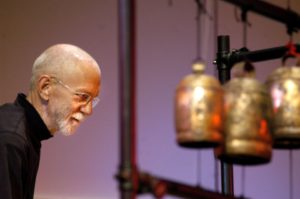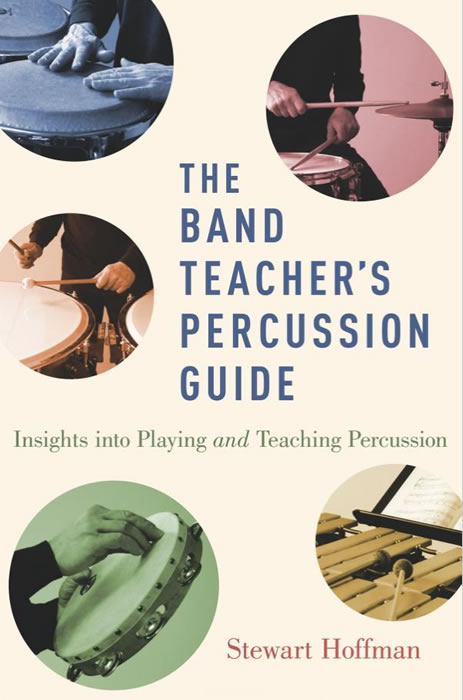
John Wyre (Photo: Greg Locke)
On March 25th [2007] a memorial concert for percussionist John Wyre was held at Toronto’s Music Gallery. John was a remarkable person and a unique artist who I feel honoured to have known since I was a young percussion student. He passed away on October 31 [2006] at the age of 65 in St. John’s, Newfoundland.
For most of his adult life John, who was born in Philadelphia, lived in Toronto where he’d moved to assume the timpani chair of the TSO in 1966. He was a wonderful timpanist, who drew a warm, dark sound from the instrument. Seiji Ozawa prized his talents so highly that he enlisted him to perform with the Boston Symphony whenever he could.
He played for the TSO for eleven years, and anyone that attended concerts in those days surely won’t have forgotten him: tall and slim, with a long, flowing beard and shoulder-length hair, he was a doppelganger for Jesus Christ himself. And many young percussionists, myself included, were followers.
He was 1960s hip, and his downtown apartment, above a hairdresser on Yonge Street south of St.Clair, was unlike anything I’d ever seen.
I remember the thrill I felt walking up the narrow staircase and into a room filled with exotic instruments: Balinese nipple gongs, assorted African and Chinese drums, cymbals of all shapes and sizes, and bells hanging everywhere. He collected flower pots too, which he’d suspended from the ceiling and would play with yarn mallets. He was in love with sound in its purist form.
He also had brake drums (yes, the ones from cars; strike them and they produce a resonant “ping”) so I paid a visit to a wrecker for a set of my own. They were proudly displayed in my bedroom, and when I hit them with a mallet, bits of rust would spill onto the floor. I also collected some bells and picked up a dholak – a North Indian hand drum that I never learned to play.
In 1971 John Wyre co-founded the renowned percussion group Nexus. Each member of this remarkable ensemble brought something unique to the whole, but I can’t help thinking that within John, more than anyone, rested its soul.
In the early 1980s John began producing and directing a series of monumental World Drum festivals. He pulled together 250 drummers for Vancouver’s Expo ’86 – including tribal drummers from Africa and Indonesian gamelan orchestras. Rhombus Media documented the event in the film World Drums.
He retired from Nexus in 2002 and, with his wife Jean Donelson, moved to St. John’s Newfoundland in order to focus on music composition. He had already distinguished himself as a composer, with his Connexus having been performed by the TSO as well as the Cleveland Orchestra and the New York Philharmonic. I only saw him once after that, at a concert in Toronto. He’d written a book, his memoirs, which I bought and had him inscribe. I spoke to him briefly over the phone when I heard that he was struggling with cancer of the jaw. It came as a shock, though, when I heard that it had taken his life.
The memorial concert brought together musicians that had been close to John. Several of his compositions were performed, as were pieces from Africa, Brazil, Georgia and the Middle East. An old interview was broadcast. Bill Cahn, of Nexus, and percussionist Sal Ferreras shared reminiscences. Though most that attended were personally touched by John’s passing, the tone was upbeat – a celebration of a profoundly rich and rewarding life. But when Nexus performed the final work, a traditional Zimbabwean piece called Tongues, I choked up a little.
The lead instrument of the piece is the mbira, also known as a thumb piano. It’s mounted within a gourd topped with beads that buzz ever so lightly when the tongues of the instrument are plucked. The sound it creates is clear and gentle. The music itself has a haunting beauty; simple and direct, it has a lilt to it that produces a calming effect. It wasn’t until I began writing this piece that I looked up Tongues on Nexus Percussion, where I read: “In the Shona culture of Zimbabwe, the mbira is strongly associated with memories of departed ancestors and with the experience of remembering in general.”
Mbira is also the name of the mystical music the instrument produces. John himself was a spiritual man, and I discovered that this was his favourite piece. Not surprisingly, I heard a lot of John in this music.
He will be remembered by his colleagues and friends as a unique musical voice and a beautiful human being.


